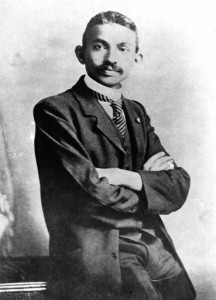What should we make of the way Mahatma Gandhi spoke about black people?
According to a new book by two South African academics, the Mahatma regarded black people in much the way Winston Churchill regarded him. Churchill called the leader of the Indian freedom movement a “half-naked fakir”. Gandhi, according to the book by Ashwin Desai and Goolam Vahed, said black Africans lived a life of “indolence and nakedness”.
There are several choice quotes that Professors Desai and Vahed have pulled from the Mahatma’s writings to illustrate how he felt about black Africans during the time he lived in South Africa. (That was between 1893 and 1914, when he returned to India.) I’ve listed a selection at the bottom of this post.
But meanwhile, what should we make of the way Mahatma Gandhi spoke about black people?
Three things.
- First, he was a product of his age. He lived at a time when racial hierarchy was pretty well established and everyone wanted to preserve the pecking order. The whites were at the top of the tree; lighter-skinned brown people came second; blacks came last.
- Second, whatever gloss is put on the Mahatma’s words today, it’s obvious that he isn’t just politically incorrect in 21st century terms. He really did think black Africans were less evolved than Indians. Equally objectionably, he also accepted that white people were higher. Why else would he describe his experience of prison segregation in 1908 as follows: “We could understand not being classed with the whites, but to be placed on the same level with the Natives seemed too much to put up with.”
- Third and last, it is we who have given the Mahatma this particular honorific suggesting he was a great soul. He never asked for it and never claimed to be anything other than flawed and struggling with his demons. He was not a paragon of virtue or a perfect human being and never claimed to be.
——————————————–
A sample courtesy The Washington Post of what the Mahatma said about black South Africans:
- Objected to the fact that Indians had to use the same entrance as blacks at Durban post office, he said “We felt the indignity too much and … petitioned the authorities to do away with the invidious distinction, and they have now provided three separate entrances for natives, Asiatics and Europeans.”
- He said that a lower legal standing for Indians would result in degenerating “so much so that from their civilised habits, they would be degraded to the habits of the aboriginal Natives, and a generation hence, between the progeny of the Indians and the Natives, there will be very little difference in habits, and customs and thought.”
- In an open letter to the Natal Parliament in 1893, Gandhi wrote: “I venture to point out that both the English and the Indians spring from a common stock, called the Indo-Aryan. … A general belief seems to prevail in the Colony that the Indians are little better, if at all, than savages or the Natives of Africa. Even the children are taught to believe in that manner, with the result that the Indian is being dragged down to the position of a raw Kaffir.”
* At a speech in Mumbai in 1896, Gandhi said that the Europeans in Natal wished “to degrade us to the level of the raw kaffir whose occupation is hunting, and whose sole ambition is to collect a certain number of cattle to buy a wife with, and then, pass his life in indolence and nakedness.”
* Protesting the decision of Johannesburg municipal authorities to allow Africans to live alongside Indians, Gandhi wrote in 1904 that the council “must withdraw the Kaffirs from the Location. About this mixing of the Kaffirs with the Indians, I must confess I feel most strongly. I think it is very unfair to the Indian population and it is an undue tax on even the proverbial patience of my countrymen.”
* In response to the White League’s agitation against Indian immigration and the proposed importation of Chinese labour, Gandhi wrote in 1903: “We believe also that the white race in South Africa should be the predominating race.”
* Gandhi wrote in 1908 about his prison experience: “We were marched off to a prison intended for Kaffirs. There, our garments were stamped with the letter “N”, which meant that we were being classed with the Natives. We were all prepared for hardships, but not quite for this experience. We could understand not being classed with the whites, but to be placed on the same level with the Natives seemed too much to put up with.”


